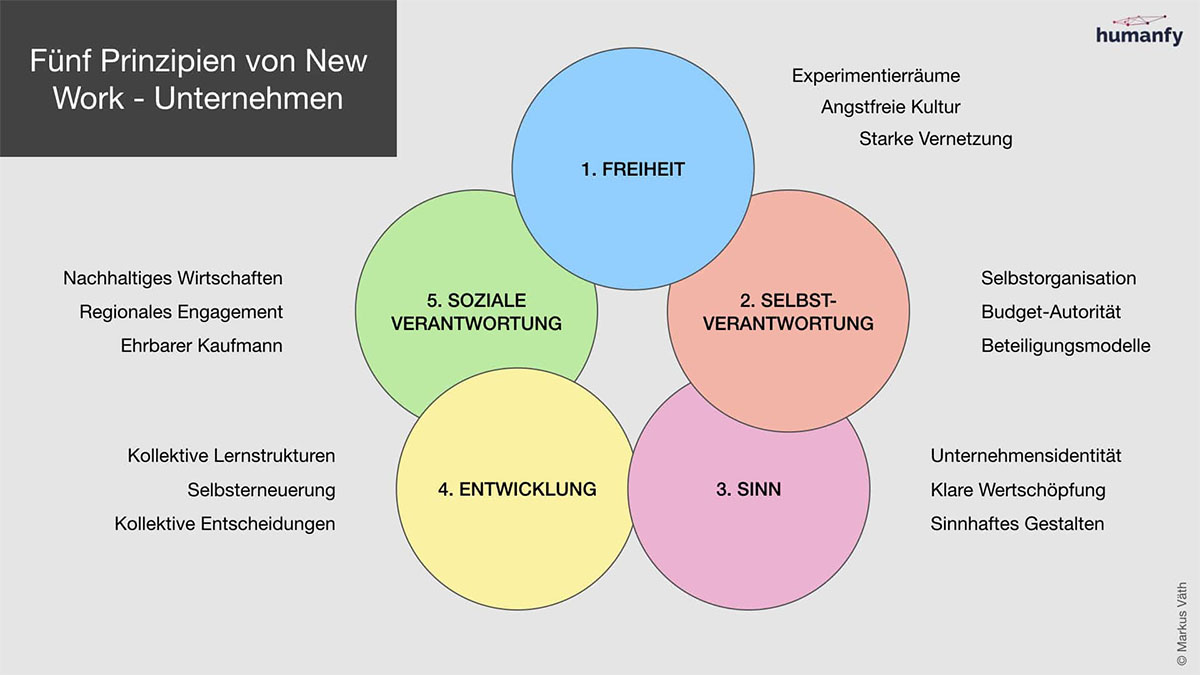Is New Work just business theatre?
For years, many articles on New Work have been circulating on the internet and in relevant magazines and books. All these contributions focus on the hope that people will finally find fulfilment in work again and thus escape alienation.
In this article, I will present a chain of arguments that the intention behind New Work is well-intentioned and honourable, that I even welcome it, but that I recognise a big blind spot in the current implementation, which is why all current initiatives are coming to nothing: The structures in the organisations that condition people to think and act in a certain way.
My observations around New Work
Which theses do I often hear in connection with New Work?
- People should find fulfilment in their work.
- People should do what they really want and can do.
- People should be able to contribute.
- People should know why they are there in the first place and what value they generate.
- People should be able to develop and learn.
- People should enjoy their work.
You will certainly find a whole range of other positive, people-oriented points. I also fully share these contents, as they sound so incredibly logical to me. I cannot find one of the points listed above where I could say the opposite in good conscience. So the contents are banal for me.
By the way, I regularly get the grounding for this validation at home, with my two kids who are not yet in the “economy” system. Whenever I have told them at home in the past what we often talk about in the context of work, they look at me askance. My kids often ask why we talk about things that are so obvious.
We spend a large part of our lives working. And then we discuss such banalities. It is as if we are constantly talking about whether it would make sense to eat food. We feel hungry and there is food in front of us, but we talk about how we should probably hold the cutlery in our hands and whether the cutlery looks shiny enough.
We talk about content again and again because we notice that this content is insufficiently implemented. However, constantly repeating this content does not make things better. I rather ask myself why ideas that seem so incredibly right and are also shared by many people are not implemented. There must be a reason for this. And I find it in the prevailing structures in the “economy” system.
The actual intention behind New Work
But before I write about the reasons I have observed, I would like to turn to the term “New Work” historically. Frithjof Bergmann invented this term in the 70s of the last century and developed its content. He recognised that the “job system” was at its end and took this as a basis for exploring whether we humans could free ourselves from the “bondage of wage labour”. For this liberation, in his opinion, independence, freedom and participation in the community were the central values of this “new work”. He divided work into 3 areas:
- Gainful work (“smart consumption”)
- Self-sufficiency at the highest technical level (“high-tech self-providing”)
- “Work that you really, really want”
If you would like to learn more about his ideas, I recommend this interview, in which Bergmann talks in great detail about his life and his ideas.
I believe that we have now reached a stage of progress where the 3rd part of the “new work” mentioned by Bergmann, work that we really, really want, can prevail more than before. I also hear this in many discussions of the current New Work hype, see the theses I mentioned at the beginning of this post. However, I am not sure if the discussants are even familiar with Bergmann and his major work “New Work, New Culture”. Andreas Zeuch has reviewed the book as part of his book tips.
In the meantime, there have also been some expansions of Bergmann’s ideas to adequately take into account today’s new social influences. At this point I would like to mention Markus Väth with his New Work Charter. I appreciate Markus very much for this initiative, which I also signed myself.
Five principles of New Work companies (extract from New Work Charter)
- Why do we not manage to implement these ideas that are so good for people?
- Or, what has to happen so that we can implement these ideas?
Again and again, it’s all about content. In my eyes, we should not concentrate on finding a 7th, 8th or 98th content dimension to define New Work. We should rather explore which basic conditions should be created in order to be able to implement this content. That is what I am writing about now.
Why are we currently still miles away from New Work?
What are actually the bonding forces between people and companies? What makes people formally join a company? In my observation, fear predominates in this regard. The fear of being excluded from the system is something I observe again and again in people. If people lose their jobs, they no longer earn money, which leads to their viability being weakened. How then are they supposed to pay rent, current loans, children’s education, food, etc.?
It is difficult to be creative on the basis of fear. Fear also does not necessarily lead people to really want to realise themselves or fuel progress. People mutate into vicarious agents in the context of work. The saying “Never bite the hand that feeds you” comes to mind here.
I believe that we should start with precisely these binding forces in order to create a basis for implementing the ideas around New Work. Fear must give way to other feelings here. It would be better if people were only members of a company if they really really wanted to be. The hurdles for joining and leaving should not be too high. People’s ability to live should be less affected by this. This increases the permeability of companies, which leads to companies being able to pursue their actual tasks again, reducing scarcity in society, with which they would then generate value.
With this described permeability, not only is the power of companies towards people reduced (threat of unemployment and thus exclusion), but also the power of companies towards politics (threat of many unemployed). Examples of this power being played out can be observed again and again, see the car manufacturers’ scrappage scheme or state aid for Lufthansa. In crises, and not only then, the big companies can “blackmail” politicians. If business goes badly, there is a danger that many people will become unemployed, which is why these companies are not allowed to go under due to the system.
In my view, it makes no sense at all to criticise the managers of these companies. As long as our structures allow people to “earn” money in such an easy way, it will continue to happen.
With this permeability, we create structures in which companies have to ensure their viability solely on the basis of their value generation for society, and not solely on the basis of their size. How can this be achieved? I find one possibility in an unconditional basic income and thus in a bifurcation of salaries. This bifurcation of the salary also fuels Bergmann’s envisaged tripartite division of the “new labour”. Details can be found in this paper.
Within the current structures, New Work is not just business theatre, or more “appearance than reality”. No, in my eyes it is also contemptuous of human beings. People are constantly being told that they can contribute and realise their potential, but the structures do not encourage this, rather the opposite. In order to do so, they would have to have the courage to rebel against the structures, which I personally will never demand of people.
Without establishing new structures in which power is taken away from companies, the pursuit of New Work will remain business theatre at best.
Notes:
If you like the post or want to discuss it, feel free to share it in your network.
Conny Dethloff has published another article on the t2informatik Blog:

Conny Dethloff
Conny Dethloff was born in 1974 and graduated as a mathematician in 1999. Immediately afterwards, he entered the business world as a management consultant at PwC and IBM Deutschland GmbH until 2011 and then as Senior Manager in the Business Intelligence division at OTTO GmbH & Co KG from 2012 to 2020. His task there was to lead OTTO into the digital age in the context of BI, Big Data and culture.
After working for borisgloger consulting GmbH from mid-2020 to the end of 2023, he has been working as an organisational designer for emergize GmbH & Co. KG and helps people in organisations to find and establish suitable structures and processes in the context of value generation.
Since 2009, he has been reflecting on the insights he generates in his daily work in his logbook Reise des Verstehens (Journey of Understanding).

